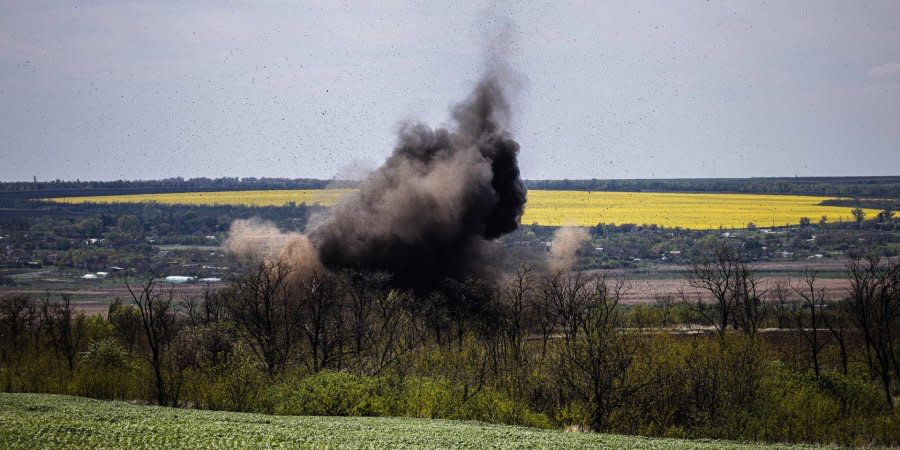The war is wreaking havoc on Ukraine’s environment

The destruction of industrial objects and infrastructure is leading to environmental pollution, deforestation, and unbalanced ecosystems.
At the State Ecological Service of Ukraine, a task force of over 70 scientists from across the world are busy carefully recording the damage to Ukraine’s environment that the country is sustaining from the Russian invasion.
To date, they have documented nearly 300 ecological crimes, with several of them causing UAH 200 billion ($6.77 billion) in damage. The final figure will eventually be used in forthcoming legal battles between Kyiv and Moscow, at various international courts and tribunals.
Read also: Chornobyl NPP director reveals the extent of looting by withdrawn Russian forces
NV spoke with the chair of the taskforce, Oleksiy Obrizan.
NV: What kind of fighting harms the Ukrainian environment the most?
Obrizan: First and foremost – massive field and forest fires, which ruin unique ecosystems, like the Kinburn Sandspit near Mykolaiv. They also pollute the air with combustion products, which can be rather hazardous – like near the Chornobyl NPP, for example.
Second - fires at oil depots, at commercial and industrial sites. fire at Chernivtsi.
Forest fires rage across much larger areas and are harder to contain. Not to mention, it takes decades to replace a forest – in contrast with a mall.
Third – air pollution from military vehicles. Soviet-era tanks, IFVs, and jets weren’t made with emissions control in mind. Peacetime air pollution from cars was at least moderated by Euro-5 and Euro-6 ecological standards.
We’re yet to receive the full data on destroyed Russian air targets from our Defense Ministry, so the scope of environmental harm from them will become clear only after hostilities cease.
Martial law has suspended all kinds of ecological inspections for the industry, meaning that substantial damage is being done by unchecked emissions, produced by Ukrainian companies.
NV: Is there going to be a long-term cumulative impact from this air pollution?
Obrizan: Most assuredly so. While daily average air pollution levels are within acceptable bounds, there still is an immediate impact from sharp spikes in (pollutant) concentrations – following explosions, for example.
These compounds are substantially heavier than air, so they quickly soak into the soil via precipitation. Much is determined by wind patterns: it’s possible that neighboring Poland, Slovakia, Hungary, or Romania could have their soils contaminated with precipitation, blown from Ukraine.
NV: How will all this environmental damage impact people’s health?
Obrizan: After the war, we’ll be looking at declining life expectancy across the board – including from air pollution, which is a universal trend. For example, the median age of people with chronic illnesses in Iraq has declined significantly, following the (Gulf) war.
We can expect healthcare costs to substantially increase in Ukraine, especially when it comes to cardiovascular and respiratory conditions.
NV: What about Ukraine’s water table?
Obrizan: A very difficult situation there. Much damage is being done by the destruction of dams and water treatment facilities. This means that sewage is flowing into bodies of water, especially in areas of intense clashes. When the dam in Irpin, near Kyiv, was ruined, vast swathes of agricultural land were flooded.
Artesian aquifers are facing a more complex, long-term threat. These subterranean waters used to be sealed strategic water reserves. In recent times, they became privately accessible – any individual or business could drill into them. The damage, unleashed by the war, is contaminating these wells.
A single point of entry will lead to the contaminant spreading laterally, making water in the entire aquifer undrinkable. While surface waters takes months to cycle through, the process takes hundreds of years for the subterranean water table.
We've received reports of damaged chemical waste tanks at Mariupol's Azovstal steelworks. This hazardous waste could potentially contaminate the Sea of Azov. Entire marine bio cultures could face extinction. It's hard to say if all life in the sea is threatened, since neither Ukrainian, nor international environmental scientists can access the area to take samples.
NV: Is it possible to hold Russia accountable for these environmental crimes?
Obrizan: We’re calculating ecological damage. We have a register of soil, air, water, forest, biological, and subsoil pollution. It contains data from open sources, reports from law enforcement, and appeals from citizens. There are currently over 200 entries, but damages were calculated for only a couple of them, to illustrate the scope of the problem.
There are at least six major such databases around Ukraine, including those maintained by the SBU (Security Service of Ukraine), Interior Ministry, State Emergency Service, and some NGOs.
Eventually, data from all of them will be combined, support government lawsuits in international courts. Ukraine will demand restitution and reparations, funded by the frozen Russian assets. Environment and ecology will be a component, along with infrastructure and socio-economic damage.
Read also: Nine Russian attempts to cross river in Donbas thwarted by Ukrainian paratroopers
At the same time, it’s difficult to prove environmental crimes in courts. For instance, Saudi Arabia managed to get only 6.3% of the ecology reparations it demanded after the Gulf War. Lost harvests, caused by air pollution from burning oil fields, remained unproven.
Similarly, Ukraine will have to prove that our grain harvest was lower due to the consequences of the war – as opposed to general climate change. This is but one of many complex cases in this regard. But we're confident we can win.

